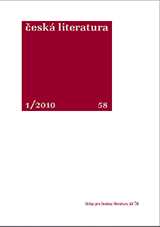Recepce básnické promluvy jakožto specifická časová zkušenost
The Reception of Literary Discourse as a Special Temporal Experience
Author(s): Tomáš KoblížekSubject(s): Literary Texts
Published by: AV ČR - Akademie věd České republiky - Ústav pro českou literaturu
Keywords: phenomenology; Prague Structuralism; act of reading
Summary/Abstract: This phenomenological analysis of literature comprises a description of the relationship of two related poles of experience: the noetic (which in the case of literary discourse is the ‘act of reading’) and the noematic (again, in literary discourse, the structure of the literary utterance, which shapes the ‘act of reading’). The preliminary conclusions that were reached both by proponents of a poetics based on experience and the philosophy of art (in particular, Kant and the Constance School) and by proponents of Prague Structuralism (Jan Mukařovský, Felix vodička, and Milan Jankovič) constitute a starting point of the phenomenological reflection on poetic utterance. The epistemological pole becomes manifest in time: the time of reading is the time of particular expectations (which spread around the centre of the experience of this moment), the special meeting of these expectations and the retention of the experience so far. (recall Iser’s interpretation of Husserl’s phenomenology of the inner consciousness of time). The noematic pole (which must be emphasized in contrast to Iser’s conclusions) is not then comprised of the work’s fictional world, but of structural bundle of linguistic components (the acoustic and semantic layers), of composition (the climax and contrasts), and theme. In this we follow on from vodička’s concept of ‘concretization’. The article seeks to demonstrate the proposed principles of structural phenomenological analysis on the basis of rimbaud’s ‘voyelles’ (1871).
Journal: Česká literatura
- Issue Year: 58/2010
- Issue No: 1
- Page Range: 42-58
- Page Count: 17
- Language: Czech

